Top Ecommerce Customer Services Software Compared for 2025
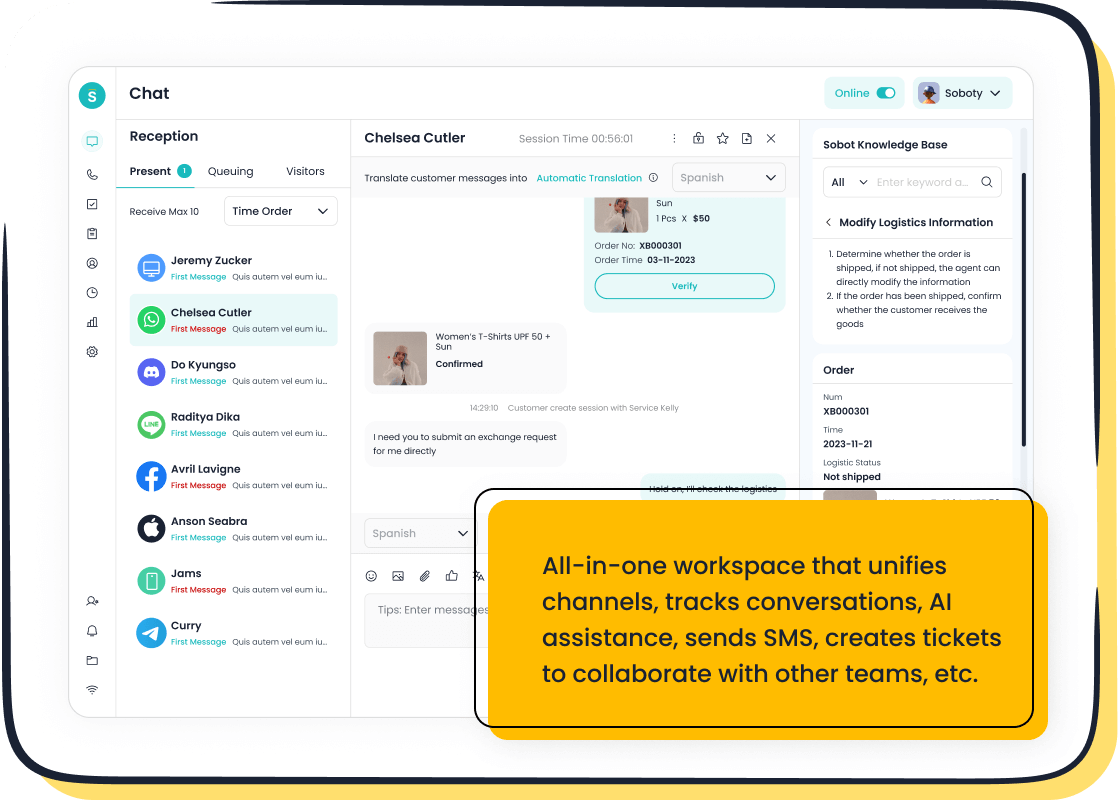
In 2025, ecommerce customer service software with advanced AI and omnichannel support drives real business growth and customer satisfaction. Companies see major gains when they adopt solutions that automate tasks and personalize every interaction. Recent data shows:
- 34% of companies identify customer service as their top AI use case.
- Over 92% of top e-commerce brands use AI-powered customer service tools.
- 82% of shoppers prefer chatbots for instant help.
- Businesses that invest in ecommerce customer services solutions report higher retention and a 20% boost in satisfaction.
Sobot stands out by offering a unified omnichannel solution, Sobot AI, and Sobot call center tools for seamless e-commerce support.
Overview of Ecommerce Customer Services
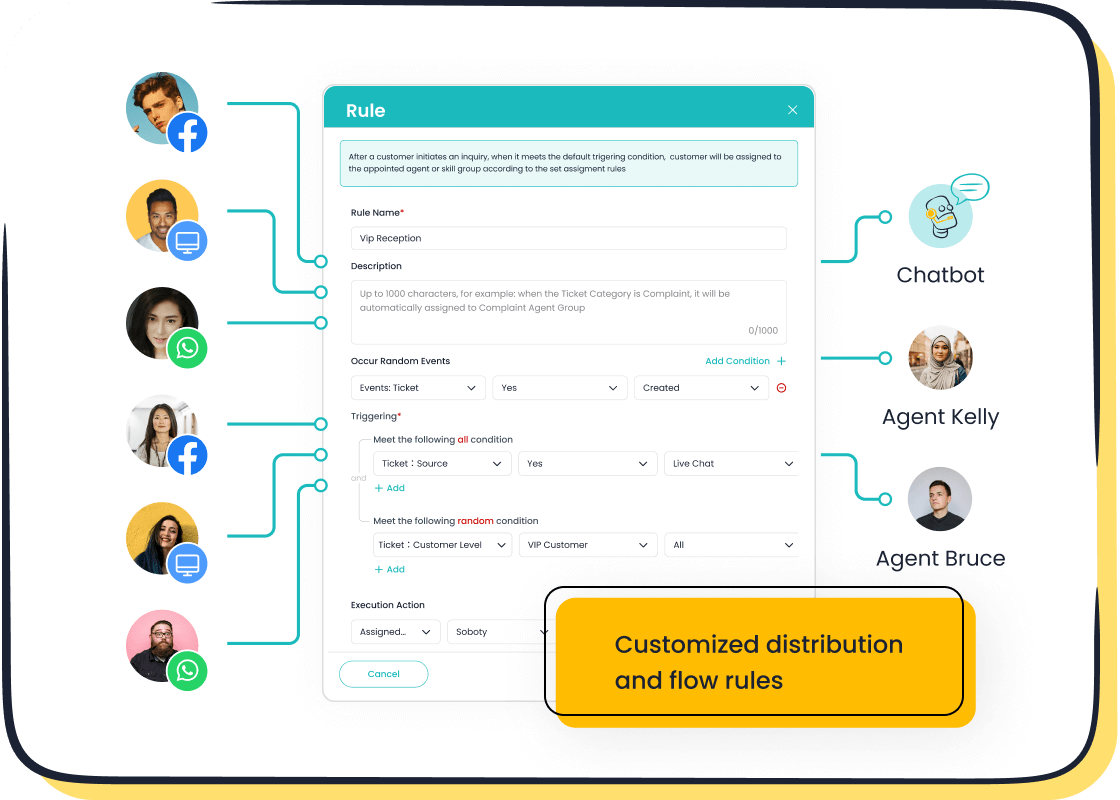
What Is Ecommerce Customer Service Software
Ecommerce customer service software helps businesses manage and improve every interaction with their customers. This software brings together tools that support communication, solve problems, and track customer needs across different channels. Companies use these platforms to answer questions, resolve issues, and provide information quickly. The main goal is to create a smooth user experience and boost customer satisfaction.
In 2025, ecommerce customer service software comes in several types. Each type serves a unique purpose and fits different business needs. The table below shows the most common types and their features:
| Type of Software | Description | Key Features |
|---|---|---|
| CRM | Stores customer purchase history and interaction data for easy access. | Customer data management, personalized engagement. |
| Live Chat Software | Provides real-time support via text chat, faster than phone support. | Instant responses, chat support. |
| Ticketing Systems | Tracks and organizes customer interactions across channels. | Ticket tracking, workload distribution, collaboration, efficiency measurement. |
| Self-Service Portals | Enables customers to resolve issues independently without direct contact. | Self-help resources, FAQs, instant resolution. |
| Suites (All-in-one) | Integrates all above tools into a single platform. | Omnichannel support, automation, analytics, AI features. |
Modern solutions like Sobot Live Chat combine these features into one platform. Sobot supports omnichannel communication, AI-powered chatbots, and real-time analytics. This approach helps businesses deliver fast, personalized service and manage all customer care tasks from a single workspace.
Why Ecommerce Customer Services Matter
Ecommerce customer services play a vital role in business success. Good customer care builds trust and keeps shoppers coming back. Studies show that 60% of consumers switch brands after poor service. On the other hand, 68% are willing to pay more for brands known for excellent customer support (source).
Ecommerce customer service software offers several benefits:
- Omnichannel support lets customers reach out through their favorite channels, such as live chat, email, phone, or social media.
- Automatic call routing and AI chatbots provide instant help, reducing wait times and improving user experience.
- Centralized dashboards give agents a full view of customer history, making it easier to offer personalized solutions.
- Self-service tools, like FAQs and knowledge bases, allow customers to solve simple problems on their own, which can reduce support tickets by 42% and speed up response times.
Note: Retaining customers is cost-effective. A 5% increase in retention can boost profits by up to 25%. Positive customer experiences lead to higher loyalty and more repeat purchases.
Ecommerce platforms that invest in advanced customer support software see higher customer satisfaction and stronger brand loyalty. Sobot’s all-in-one solution helps businesses automate tasks, personalize service, and scale as they grow. This ensures every customer receives timely, helpful support, which is essential for long-term success in e-commerce.
Key Features in 2025

Must-Have Capabilities
Ecommerce customer service software in 2025 must deliver more than basic chat or ticketing. Businesses now expect customer support tools to provide real-time, personalized help across every channel. Omnichannel support stands out as a core requirement. Companies need to manage customer interactions on websites, apps, SMS, WhatsApp, and social media without missing a beat. Integration with e-commerce platforms like Shopify and Amazon ensures agents have instant access to order and customer data.
AI-powered customer service is no longer optional. Modern customer service software uses AI to automate responses, route tickets, and analyze sentiment. This technology helps agents resolve issues faster and improves user experience. Self-service support features, such as AI chatbots and knowledge bases, empower customers to find answers on their own. These tools reduce wait times and free up agents for more complex tasks.
Sobot Live Chat offers a unified workspace, omnichannel support, and seamless integration with e-commerce platforms. Its AI-driven customer support tools help businesses boost conversion rates and extend customer lifecycles. Built-in analytics and customer segmentation allow for targeted service and data-driven decisions.
Note: Businesses using comprehensive customer support solutions see a 91% higher increase in customer retention when adopting omnichannel strategies.
Trends in E-commerce Customer Support
The landscape of e-commerce customer service software is evolving rapidly. By 2025, 95% of customer interactions are expected to be AI-powered. Companies are investing in customer support software that blends automation with human empathy. AI-powered customer service tools now handle instant responses, personalized recommendations, and even dynamic discounts.
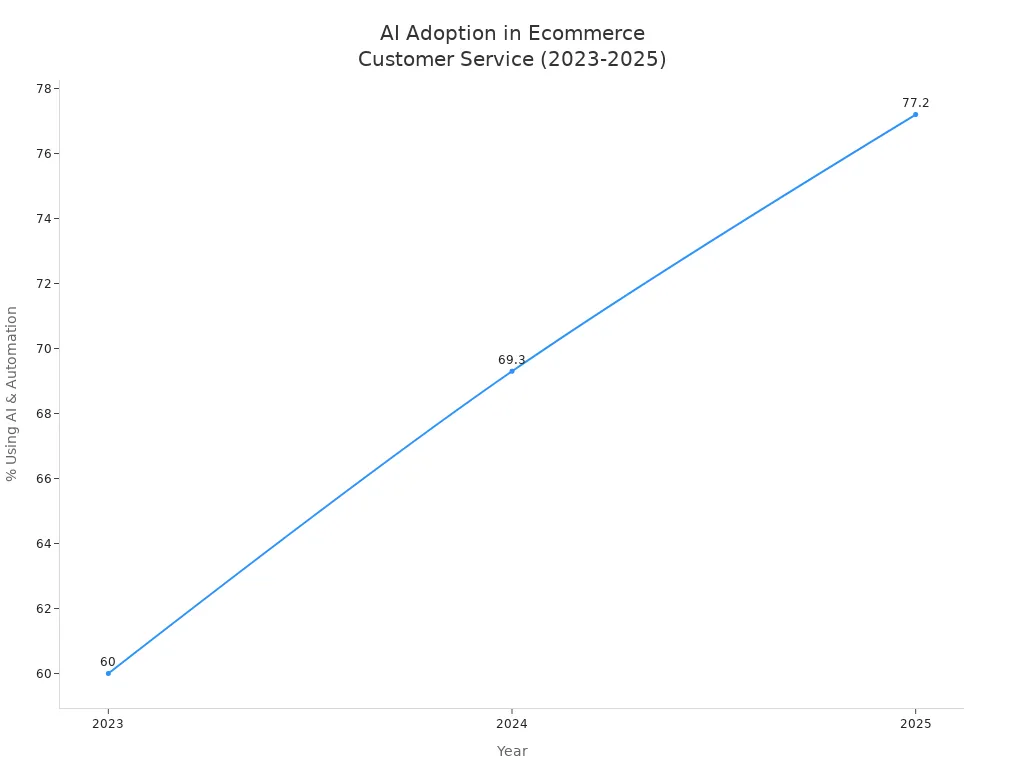
Omnichannel integration is transforming the customer experience. Customers often start a support inquiry on social media and finish it via phone or chat. Customer support tools unify these touchpoints, ensuring seamless transitions and consistent service. Self-service support is also on the rise, with AI chatbots providing 24/7 help in multiple languages.
The adoption of AI and automation in e-commerce customer service software has surged. In 2023, fewer than 70% of professionals used AI and automation. By 2025, this number will reach over 77%. Brands like TUSHY and Caitlyn Minimalist have seen dramatic improvements in sales and response times by leveraging these technologies (source).
Sobot’s comprehensive customer support platform reflects these trends. Its features and benefits include AI-powered chatbots, omnichannel support, and deep integration with e-commerce platforms. These capabilities help businesses deliver exceptional user experience and drive growth.
Top Ecommerce Customer Service Software
Choosing the right ecommerce customer service software shapes the future of any online business. In 2025, companies need solutions that combine automation, omnichannel support, and actionable analytics. Below is a detailed comparison of the best customer service software for ecommerce, focusing on features, pricing, strengths, and ideal use cases.
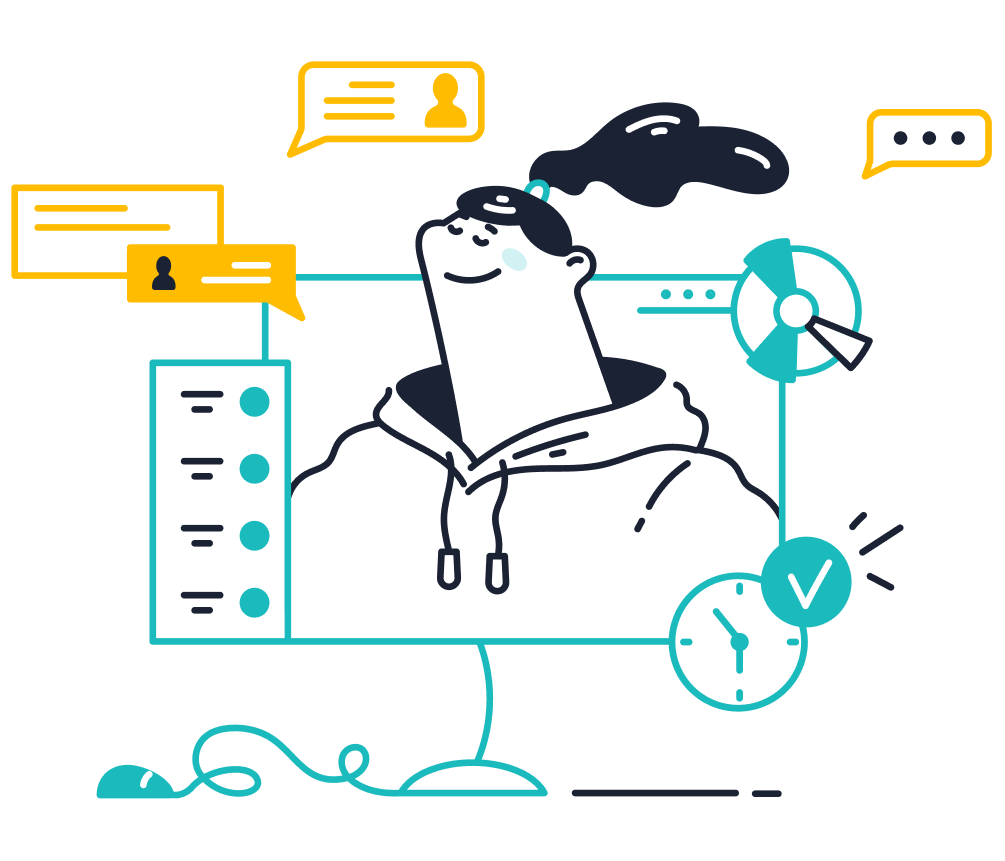
Sobot Live Chat
Sobot Live Chat stands out as a leading retail & e-commerce call center software. The platform delivers a comprehensive customer support experience by unifying live chat support, AI-powered chatbots, and omnichannel support in one workspace. Businesses can connect with customers across websites, apps, WhatsApp, Facebook, Instagram, Telegram, and Discord. This ensures no missed conversations and a seamless customer journey.
Key features include:
- 24/7 Automated Customer Service: Sobot’s AI chatbots and virtual assistants handle inquiries around the clock, reducing operational costs and improving customer satisfaction. Companies have reported savings up to $1.3 million by lowering ticket volumes.
- Multilingual Capabilities: Sobot supports global engagement, breaking language barriers with auto-translation and multilingual bots.
- Unified Workspace: Agents manage all customer interactions from a single dashboard, boosting efficiency and reducing response times.
- Advanced Analytics: Over 150 indicators help businesses optimize service quality. Customizable reports provide deep insights into customer care performance.
- No-Code Implementation: Businesses of all sizes can deploy Sobot quickly, without technical hurdles.
- Integration: Sobot connects with major ecommerce platforms, CRMs, and support tools, streamlining workflows and enhancing operational efficiency.
- Omnichannel Support: Customers receive consistent service across every channel, improving loyalty and conversion rates by up to 38%.
Sobot emphasizes ethical AI, data protection, and transparency, building trust with both businesses and customers. The platform’s intelligent knowledge base ensures accurate, relevant responses, while seamless integration with CRM and other customer service software enhances utility. Sobot’s retail & e-commerce call center software adapts to diverse industries, making it a top choice for brands like Samsung, OPPO, and Weee!.
Tip: Sobot offers a free trial, allowing businesses to experience its benefits before committing. Learn more.
Zendesk
Zendesk remains a popular choice among ecommerce customer service platforms, especially for mid-sized and large businesses. The platform consolidates email, chat, phone, social media, and messaging apps into one system, making it a robust retail & e-commerce call center software.
| Plan | Price (per user/month) | Key AI Features |
|---|---|---|
| Suite Professional + add-on | From $115 | AI-powered triage, intent detection, generative replies, macro suggestions, basic bot flows |
| Suite Enterprise + add-on | From $150 | Advanced bots, skills-based routing, custom workflows, model explainability, deployment controls |
| AI Add-on | $50 | Conversational AI bots, automated summarization, advanced agent assist |
Zendesk’s AI automates ticket triage, drafts responses, and detects customer intent, reducing manual work for agents. The platform’s automation tools—triggers, macros, and workflows—speed up responses and improve productivity. Zendesk also provides advanced analytics and real-time reporting, helping businesses optimize their customer care software operations.
User reviews highlight Zendesk’s deep feature set, scalability, and strong multi-channel support. However, some users mention a steep learning curve and high pricing, especially for advanced AI modules.

Zendesk suits enterprises needing scalable, AI-augmented customer support tools. It is ideal for regulated industries and Fortune 500 companies seeking compliance, workflow automation, and comprehensive customer support.
Gorgias
Gorgias has carved a niche as a retail & e-commerce call center software tailored for Shopify and similar platforms. The software offers a fluid, intuitive interface and automates up to 30% of tickets, saving time on recurring requests. Gorgias integrates natively with Shopify, BigCommerce, and Magento, allowing agents to access order details and process refunds within the support interface.
| Advantages of Gorgias | Disadvantages of Gorgias |
|---|---|
| Easy-to-learn interface | Not suitable for complex or multi-brand organizations |
| Efficient automation (up to 30% of tickets) | Lacks integrated self-service knowledge base |
| Native ecommerce integrations | Fewer advanced automation and help center features |
| 20-40% reduction in resolution time | |
| Responsive customer support |
Gorgias supports multichannel communication (email, live chat, social media) in one dashboard. Automation and AI features handle repetitive queries, though over-reliance may reduce personalization. The platform’s analytics provide insights into support performance, but users should focus on relevant metrics to avoid data overload.
Gorgias is best for small to mid-sized ecommerce brands seeking fast setup, Shopify integration, and efficient automation. It may not suit complex or multi-brand organizations needing advanced support structures.
Freshdesk
Freshdesk is a versatile retail & e-commerce call center software known for its broad integration ecosystem and advanced automation. The platform supports over 1,000 integrations, including CRM, analytics, telephony, and project management tools. Freshdesk’s omnichannel support covers email, phone, chat, and social media, but it lacks direct integration with Amazon Seller Central.
Key features include:
- Workflow Automator: Enables complex, multi-step workflows and advanced ticket routing.
- Freddy AI Engine: Powers sentiment analysis, triage, and ticket field suggestions.
- Native Knowledge Base: Offers multilingual help centers and AI-powered bots for self-service.
- Customizable Dashboards: Provide actionable insights into customer interactions and team performance.
Freshdesk’s automation features, such as time-triggered rules and scenario automation, make it suitable for global teams. The platform’s scalability and extensibility position it as one of the best customer service software options for growing ecommerce businesses.
Intercom
Intercom delivers a modern approach to ecommerce customer service software, blending conversational support, automation, and AI. The platform’s AI chatbot, Fin, handles 50% of customer inquiries and engages in over 20% of interactions, showcasing advanced AI capabilities.
| Feature Category | Description & Benefits for Ecommerce Businesses in 2025 |
|---|---|
| Live Chat & Messaging | Real-time conversations via robust chat widget, ideal for instant support and lead capture. |
| Automated Workflows & Bots | Customizable bots automate responses and route inquiries efficiently. |
| Knowledge Base Integration | Searchable help center integrated with chat for 24/7 self-service support. |
| Multi-channel Support | Centralizes messages from email, chat, and social media into a unified inbox. |
| Customer Data Platform (CDP) | Enriches conversations with user profiles and behavioral data, enabling personalized support at scale. |
| Outbound Messaging & Campaigns | Targeted emails and push notifications based on user actions or segments. |
| Integrations & APIs | Hundreds of integrations, including popular CRMs and open APIs for custom connections. |
| Analytics & Reporting | Detailed dashboards track response times, resolution rates, and customer satisfaction. |
| User Interface & Innovation | User-friendly, modern design praised for ease of adoption and continuous innovation. |
Intercom’s blend of automation, AI, and live chat support empowers businesses to deliver fast, personalized customer care. The platform’s scalability and omnichannel messaging make it ideal for high-growth ecommerce brands.
Help Scout
Help Scout offers a reliable, user-friendly customer care software solution for ecommerce brands. The platform features a shared inbox with collaboration tools, automation capabilities, and integrations with Shopify and Slack. Help Scout’s Docs tool enables businesses to build a knowledge base, supporting customer self-service and team training.
| Strengths | Weaknesses |
|---|---|
| Shared inbox with collaboration features | No threaded email conversations |
| Automation for assigning and tagging emails | Limited reporting customization |
| Integrations with ecommerce tools | Challenging setup for non-technical users |
| Knowledge base tool (Docs) | Ongoing effort needed to maintain knowledge base |
| Security features (2FA, encryption, GDPR) | No UK or EU servers |
| Competitive pricing | Lacks snoozing/scheduling emails |
Help Scout’s straightforward reporting and competitive pricing make it accessible for growing ecommerce brands. However, businesses needing deep analytics or advanced automation may find limitations.
Other Leading Solutions
Several other retail & e-commerce call center software options stand out in 2025. These platforms offer unique features and cater to different business needs.
| Software | Standout Features | Pros | Cons |
|---|---|---|---|
| HubSpot CRM | Lead/contact management, email marketing, project management, segmentation | Free plan, all-in-one CRM | Pricing can be steep for small businesses |
| EngageBay | Engaging web visitors | N/A | N/A |
| InMoment | Customer experience analytics | N/A | N/A |
| Issuetrak | Ticket tracking and issue management | N/A | N/A |
| Kixie | Advanced calling and texting solutions | N/A | N/A |
| HelpCrunch | Customizable chat widgets | N/A | N/A |
| Smartsupp | Personalized customer experiences | N/A | N/A |
| LiveChat | Online chat and web analytics | N/A | N/A |
| Salesforce Service Cloud | AI-powered support, automation, multi-channel support, CRM sync | Highly customizable, automation boosts efficiency | Complex UI, steep learning curve |
| Richpanel | Self-service portal, agent helpdesk, automation, customer context hand-off | Clean UI, comprehensive info, easy to use | Can be slow, limited integrations |
| Odoo CRM | Call/activity management, customizable dashboards, 160+ integrations | Free plan, comprehensive integrations | N/A |
HubSpot CRM provides a free plan and integrates marketing, sales, and customer care software, making it a strong choice for businesses seeking an all-in-one solution. Salesforce Service Cloud stands out for its extensive automation and customization, though it may present a steep learning curve. Richpanel and LiveChat offer specialized customer support tools for ecommerce, focusing on self-service and analytics.
Note: The best customer service software for ecommerce depends on business size, industry, and specific needs. Companies should evaluate integration capabilities, automation features, and scalability when selecting a solution.
Comparison Table: Best Customer Service Software
Features & Pricing
Selecting the best customer service software means comparing both features and pricing. Businesses often look for solutions that balance cost with robust capabilities. The table below summarizes key platforms, their starting prices, and main strengths:
| Platform | Pricing (Starting) | Key Features & Strengths | Limitations & Cons |
|---|---|---|---|
| Sobot | Custom, free trial offered | Omnichannel support, AI chatbots, unified workspace, analytics, seamless integration | Custom pricing, contact for details |
| BigCommerce | $29.99/month (small biz) | Built-in features, scalability, strong SEO, WordPress integration | Limited free themes, higher enterprise costs |
| Shopify | $39/month | User-friendly, app ecosystem, omnichannel selling, professional themes | Transaction fees, limited customizations |
| WooCommerce | Varies (WordPress-based) | Flexible, open-source, WordPress integration | Requires technical knowledge, separate hosting |
| Volusion | Varies | Basic ecommerce features, easy to use | Fewer advanced features |
Note: While some ecommerce customer service software offers lower entry costs, expenses can rise with premium add-ons or higher sales volumes. Businesses should consider both initial and long-term costs when choosing the best customer service software for their needs.
Suitability by Business Size
The best customer service software should match a company’s size and growth plans. Some platforms work best for small startups, while others scale for large enterprises. The chart below shows starting prices and business size suitability:
| Platform | Suitable Business Size | Starting Price (per month) | Suitability Highlights |
|---|---|---|---|
| Sobot | Small to Enterprise | Custom | Flexible, scalable, supports omnichannel and AI for all business sizes |
| Shopify | Small | $39 | Easy setup, comprehensive tools for new businesses |
| WooCommerce | Small | Varies | Highly customizable for small teams needing flexibility |
| Squarespace | Small to Medium | $25 | User-friendly, scalable, strong marketing tools |
| BigCommerce | Medium to Large | $39 | Enterprise-level security, multi-channel selling, scalable for growth |
| Weebly | Small | Free tier available | Good for startups, easy to manage |
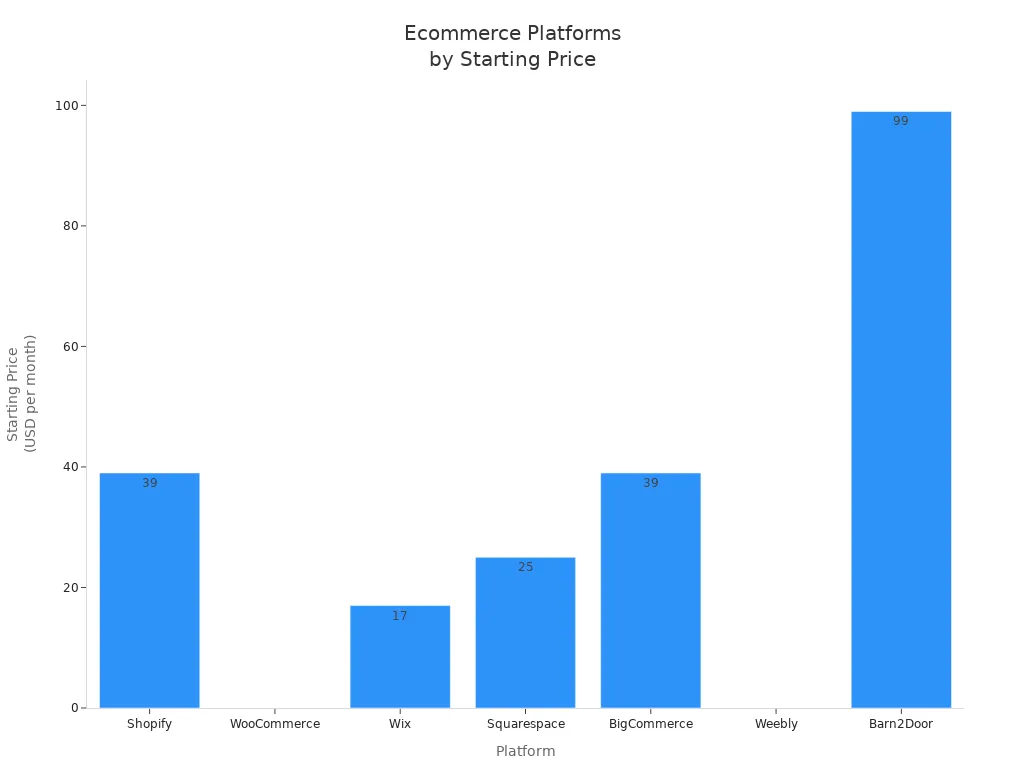
Sobot stands out for its flexibility and scalability. It supports small businesses with easy onboarding and grows with enterprises by offering advanced AI, analytics, and omnichannel support. This makes Sobot a strong choice for companies seeking the best customer service software that adapts as they expand.
Customer satisfaction scores in ecommerce average around 82%. Platforms like Sobot help businesses exceed this benchmark by providing fast, personalized support and actionable analytics. For more on Sobot’s features and benefits, visit Sobot Live Chat.
How to Choose Ecommerce Customer Service Software
Assessing Business Needs
Ecommerce businesses should start by evaluating their unique requirements. A clear understanding of customer support processes helps identify gaps and opportunities. Experts recommend the following steps:
- Use a multichannel strategy to reach customers on their preferred platforms.
- Avoid fragmented systems; select integrated solutions for seamless operations.
- Add online chat for real-time engagement.
- Diversify communication beyond phone support.
- Personalize every customer interaction.
- Train staff to use empathetic language.
- Implement efficient IVR systems for quick call routing.
- Offer alternative channels during peak times.
- Minimize customer wait times.
Sobot’s platform supports these needs by unifying communication channels and enabling personalized, efficient customer support processes.
Integration & Scalability
Integration with ecommerce platforms is essential. Real-time data synchronization across order management, inventory, and payment systems reduces errors and improves efficiency. Scalability ensures the software grows with the business, handling more traffic and complex customer support processes without performance loss. Cloud-based solutions like Sobot offer APIs for seamless integration and support business expansion. The table below highlights common integration challenges and solutions:
| Challenge | Impact | Solution |
|---|---|---|
| Data inconsistency | Delays in support and order processing | Automated mapping, real-time detection |
| Lack of interoperability | Slower response times | Middleware, strong APIs |
| Real-time syncing issues | Outdated customer information | Robust integration tools |
| Security risks | Data breaches, loss of trust | Strong security protocols |
Budget Considerations
Budget plays a key role in software selection. Businesses should plan for both initial costs and ongoing expenses. Integration and scalability can affect the total investment. Cloud-based platforms often offer flexible pricing and reduce maintenance costs. Sobot provides custom pricing and a free trial, making it accessible for businesses of all sizes.
Practical Selection Tips
Industry experts suggest these tips for choosing the best customer support tools:
- Define business goals before selecting software.
- Choose platforms that support omnichannel communication.
- Prioritize integrated CRM and self-service support features.
- Look for marketing automation and analytics capabilities.
- Select solutions that use AI to optimize customer support processes.
Sobot’s flexibility and robust self-service support make it a strong choice for ecommerce brands seeking to streamline operations and improve customer satisfaction.
Recommendations for E-commerce Customer Support
Selecting the right customer service software shapes the future of ecommerce businesses. Each stage of growth requires different tools and strategies. The following recommendations help companies match their needs with the best customer support solutions.
Best for Small Businesses
Small businesses need customer service software that is easy to use, affordable, and effective. Many owners look for platforms that simplify communication and automate routine tasks. Recent user feedback and expert reviews highlight several top choices for small ecommerce brands.
| Software | Recommendation Reason | Key Features | Pros | Cons |
|---|---|---|---|---|
| Help Scout | Most recommended for small businesses; best overall customer service tool | Email, live chat, forms, knowledge base, AI-powered email drafting, third-party integrations | AI email drafting, conversation assignments, automation workflows, integration with WooCommerce, Slack, etc. | No free plan; limited WordPress plugin functionality |
| Nextiva | Recommended for businesses needing phone and video support | Phone calls, video conferencing, emails, SMS, internal chat, CRM | Call pop feature, SMS marketing, automated workflows, ticket management | No free plan; can be overwhelming for beginners |
| WPForms | Suggested for simple contact form needs | Drag-and-drop form builder, 2000+ templates, spam protection, conditional logic, geotargeting | Easy form creation and management within WordPress dashboard | N/A |
Help Scout stands out for its simple interface and powerful automation. Many small businesses use Help Scout to manage email, live chat, and knowledge bases. Nextiva offers strong phone and video support, which helps teams stay connected with customers. WPForms provides easy contact form creation for WordPress sites, making it ideal for stores that need basic customer care software.
Sobot Live Chat also supports small businesses by offering omnichannel support and AI-powered chatbots. Owners can unify messages from websites, apps, and social media in one workspace. Sobot’s no-code setup and free trial make it accessible for startups and small teams. The platform helps agents respond quickly and personalize service, which increases customer satisfaction and retention.
Tip: Small businesses should choose customer service software that grows with their needs. Look for platforms with automation, integration, and analytics to improve efficiency.
Best for Growing Brands
Growing ecommerce brands face new challenges as their customer base expands. They need customer support tools that scale, automate tasks, and provide actionable insights. The following features make certain customer service software ideal for brands in growth mode:
- Customization to ensure responses align with the brand voice and customer needs
- Integration with CRM and existing customer service platforms
- Scalability to handle peak volumes without reducing service quality
- Automation tools such as chatbots and live chat support
- Knowledge base hosting for self-service options
- Advanced analytics providing actionable insights
Brands in this stage often use customer care software that supports omnichannel communication and flexible workflows. Sobot Live Chat offers these capabilities, allowing businesses to manage conversations across multiple channels and automate routine inquiries. The platform’s built-in analytics help managers track performance and identify areas for improvement.
For example, Sobot’s ecommerce solution enables brands to launch automated marketing campaigns on WhatsApp, SMS, and email. This feature increases engagement and conversion rates. The unified workspace lets agents access customer data and order history instantly, which improves response times and service quality. Sobot’s AI-powered chatbots provide 24/7 support, reducing ticket volume and freeing agents for complex issues.
Note: Growing brands should invest in customer service software that supports integration, automation, and analytics. These features help maintain high service standards as the business scales.
Best for Large Enterprises
Large ecommerce enterprises require robust customer support platforms that handle complex workflows and high volumes. These organizations need advanced automation, deep analytics, and strong security. The following table highlights top platforms suited for large-scale operations:
| Platform | Key Features | Ideal Users | Why Suited for Large Ecommerce Enterprises |
|---|---|---|---|
| NICE | AI-driven customer service, real-time analytics, workforce engagement, digital self-service | Large enterprises with complex needs | Scalable AI tools optimize contact centers, improve personalized interactions, and handle complex customer interactions efficiently. |
| Richpanel | AI-powered automation, self-service portals, multi-channel support (email, social media, SMS) | Ecommerce businesses of all sizes | Tailored for ecommerce with automation and self-service, reducing agent workload and supporting high-volume multi-platform interactions. |
| Bitrix24 | Unified communication, project management, CRM, internal social network, real-time collaboration | Companies with multi-step processes | Supports complex team collaboration and communication, essential for large teams managing diverse customer issues. |
| TeamSupport | Comprehensive conversation history, customizable reporting, omnichannel ticketing | Mid to large B2B organizations | Designed for complex B2B environments, enabling efficient handling of detailed customer interactions and accountability. |
| Clinked | Secure, customizable client portals, document management, white-labeling | Organizations needing secure collaboration | Centralizes communication and document management with strong security and customization, important for enterprise scale. |
| SupportBee | Simple email management focus | Small to medium businesses | Less suited for large enterprises due to simplicity and limited feature set. |
Large enterprises often choose customer service software with AI-driven automation and real-time analytics. These features help manage thousands of daily interactions and maintain high service standards. Security and compliance also play a key role in platform selection.
Sobot’s all-in-one contact center solution supports large enterprises by providing omnichannel support, advanced analytics, and seamless integration with major ecommerce platforms. Brands like Samsung, OPPO, and Weee! use Sobot to unify customer interactions and automate workflows. Sobot’s system stability reaches 99.99%, ensuring reliable service even during peak periods. The platform’s AI-powered chatbots and multilingual support help global teams deliver consistent, personalized service.
Sobot’s scalable customer support tools help large enterprises improve Net Promoter Scores, reduce costs, and increase efficiency. For more details, visit Sobot’s ecommerce solution.
Ecommerce businesses thrive when they match software to their needs. Key features like omnichannel support, AI chatbots, and analytics drive exceptional customer service and boost customer satisfaction. Companies should:
- Map workflows and list must-have features.
- Test platforms like Sobot Live Chat through free trials.
- Use unified data and automation for growth.
| Business Size | Top Recommendation |
|---|---|
| Small | Easy setup, affordable options |
| Growing | Scalable, integrated solutions |
| Enterprise | Advanced analytics, automation |
Explore Sobot’s solutions to transform support operations. Visit Sobot’s website for more details.
FAQ
What is ecommerce customer service software?
Ecommerce customer service software helps businesses manage customer interactions across channels like chat, email, and social media. These platforms automate responses, track tickets, and improve satisfaction. Sobot’s solution unifies all conversations, making it easier for agents to deliver fast, personalized support.
How does customer service software improve conversion rates?
Customer service software increases conversion rates by providing instant help and personalized recommendations. For example, Sobot Live Chat uses AI to profile visitors and deliver tailored responses, which can boost conversion by up to 38%. Quick support encourages shoppers to complete their purchases.
Why is omnichannel support important in customer service software?
Omnichannel support ensures customers receive consistent service on their preferred platforms, such as WhatsApp, Facebook, or websites. Sobot’s customer service software integrates these channels into one workspace. This approach reduces missed messages and improves customer satisfaction scores by over 30%.
Can customer service software integrate with ecommerce platforms?
Yes. Leading customer service software, including Sobot, offers seamless integration with major ecommerce platforms like Shopify and Amazon. This integration gives agents access to order details and customer history, which streamlines workflows and enhances the overall shopping experience.
What should businesses consider when choosing customer service software?
Businesses should evaluate features like AI automation, omnichannel support, analytics, and integration capabilities. Sobot’s customer service software provides a free trial, allowing companies to test its benefits. Companies should also consider scalability and data security when making a decision.
Tip: Test customer service software with a free trial to ensure it meets your business needs before committing.
See Also
Best Customer Support Software Solutions To Use In 2024
Leading Live Chat Platforms For Ecommerce Businesses 2024
Ways Live Chat Tools Increase Ecommerce Sales Effectively
Comprehensive Guide To Omnichannel Software For Call Centers
